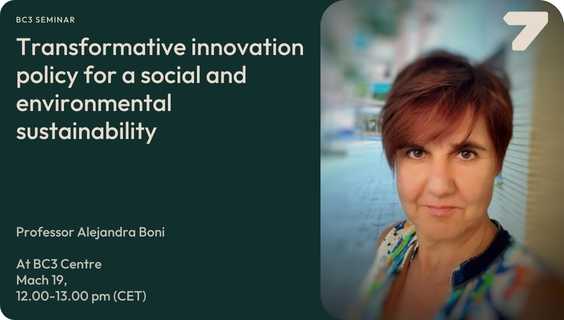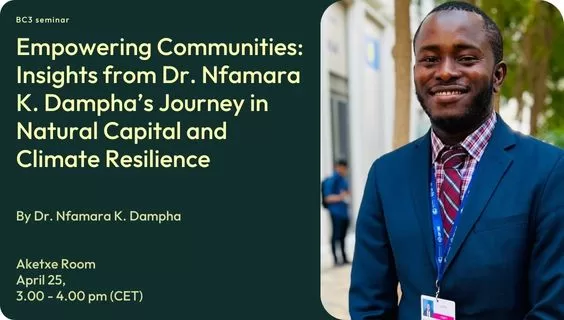Seminars
Agriculture and land use (AgLU) in GCAM: Recent updates and future prospects
BC3-Basque Centre for Climate Change Sede Building 1, 1st floor, Scientific Park of the University of the Basque Country, Leioa, Bizkaia, SpainGlobal economic and integrated assessment models are useful for understanding human-earth system dynamics under climate change. The agriculture and land use (AgLU) system is an essential component of integrated assessment, as it connects to energy, macroeconomics, and GHG emissions, and is relevant to key areas such as food security, biodiversity, and land-based mitigation measures.
Mesa redonda de BC3 sobre IA, ética y democracia
El proyecto ARIES de BC3 organiza una mesa redonda presencial el 25 de septiembre en Bilbao bajo el título “Inteligencia artificial, ética y democracia: retos y oportunidades” con la participación del Instituto de Gobernanza Democrática (Globernance), el Basque Artificial Intelligence Centre (BAIC) e Ikerbasque.
Time for energy social science! Governing multi-scalar energy transitions across sectors
BC3-Basque Centre for Climate Change Sede Building 1, 1st floor, Scientific Park of the University of the Basque Country, Leioa, Bizkaia, SpainEnergy transitions are underway everywhere simultaneously, or so one wants to think. They are in fact resisted vigorously, reshaped surreptitiously, and stripped of meaning altogether upon closer examination in unfortunately many circumstances. The urgent need for rapid action imbues large powerful actors with deep pockets with greater ability to wrest control of processes labelled energy transitions, while more inclusive, democratic, locally situated approaches cause barely an occasional flutter if measured in capital investments and gigawatt hours of clean energy production and fossil fuel displacement.
Coproducing climate risk data to improve urban adaptation and resilience decision-making
BC3-Basque Centre for Climate Change Sede Building 1, 1st floor, Scientific Park of the University of the Basque Country, Leioa, Bizkaia, SpainWe live on an urban planet, one that will become even more urban in coming decades. The polycrisis of biodiversity loss and climate change is interacting dynamically with urbanization creating a locus of impact both by, and on, cities and urbanized regions.
Co-producing adaptation knowledge for improved decision support
BC3-Basque Centre for Climate Change Sede Building 1, 1st floor, Scientific Park of the University of the Basque Country, Leioa, Bizkaia, SpainHow to best connect adaptation science and practice? In January the Stockholm Environment Institute (SEI) will host a session on insights and lessons learned related to good practice co-produced climate services for improved adaptation planning and decision-making.
Climate change adaptation initiatives in West Africa: a focus on the fisheries, livestock and wetlands sectors
BC3-Basque Centre for Climate Change Sede Building 1, 1st floor, Scientific Park of the University of the Basque Country, Leioa, Bizkaia, SpainHow can the proposed adaptation strategies necessarily impact populations in terms of positive changes to their lifestyles? The Centre de Suivi Ecologique (CSE) and the University of Gaston Berger (UGB) in Senegal, based on science and traditional ecological knowledge (TEK), are working to offer data, products and services that facilitate transformational change.
COP28: key outcomes and what next
This seminar organized at Donostia Sustainability Forum next 1st of February at 6.00pm at Miramar Palace will explore the main results of the Dubai summit, as well as the key issues that we can expect in the future with the help of María José Sanz, scientific director of the Basque Centre for Climate Change, BC3.
Forests that warm the earth and herbivores that cool it. How is biodiversity crisis affecting the climate?
BC3-Basque Centre for Climate Change Sede Building 1, 1st floor, Scientific Park of the University of the Basque Country, Leioa, Bizkaia, SpainThe biodiversity and global fire crisis have become a major concern. In the Mediterranean, woody vegetation has historically been grazed. To test the use of extensive livestock as a tool for changing the structure and composition of vegetation, we reintroduced herds in afforested areas.
Transformative innovation policy for a social and environmental sustainability
BC3-Basque Centre for Climate Change Sede Building 1, 1st floor, Scientific Park of the University of the Basque Country, Leioa, Bizkaia, SpainThis seminar we aim to create the arena for the debate on what to adapt, what to conserve, how to reduce landscape vulnerabilities to adapt to climate change. We think this seminar would be for special interests for those researchers working on SO 3 and 4 and want to find convergences, but also for every research that is based in the Basque Country and want to understand better the interconnections between humans and landscape in the long run.
Human action and landscape transformation in the estuaries of the Basque coast: contributions from Archeology
BC3-Basque Centre for Climate Change Sede Building 1, 1st floor, Scientific Park of the University of the Basque Country, Leioa, Bizkaia, SpainThis seminar we aim to create the arena for the debate on what to adapt, what to conserve, how to reduce landscape vulnerabilities to adapt to climate change. We think this seminar would be for special interests for those researchers working on SO 3 and 4 and want to find convergences, but also for every research that is based in the Basque Country and want to understand better the interconnections between humans and landscape in the long run.











